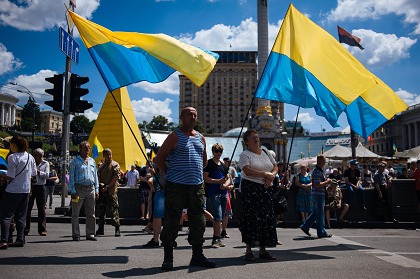By Anne Applebaum
Columnist — Washington, D.C.
WARSAW
Last month, Andrei Kuznetsov left his native St. Petersburg and flew to Ukraine. When he arrived at the Kiev airport, he asked for political asylum. The bemused guards, unaccustomed to any sort of asylum-seekers, let alone Russian asylum-seekers, couldn’t figure out what to do with him. Finally, he told a Radio Liberty reporter, “they let me in as a tourist and gave me the link to a U.N. site with procedures for applying for asylum.”
Since arriving, Kuznetsov has found it easy to adapt: “There’s no prejudice against me as a Russian citizen. There’s much greater room for personal expression here than in Russia. So I can continue to blog much more freely, without censorship, without fear that the FSB [the Russian secret police] is going to call and ask questions.” Another compatriot, Aleksei Baranovsky, feels the same way: “It’s much simpler for a journalist to work here, because the media market is competitive. The pay is lower than in Russia, but there’s greater freedom of speech and it’s possible to find media outlets that correspond with your core beliefs.”
They may not be typical, and they may not yet be numerous. They certainly don’t outnumber the thousands of Ukrainians who have been displaced by violence in eastern Ukraine and Crimea, some of whom are now refugees in Russia and others of whom have made their way to western Ukraine.
But the new wave of Russians settling in Kiev does reflect a momentous change. Not long ago, a quite senior, quite well-known Russian journalist came to see me. He was looking for a job — any job. Or rather, any job outside Russia. Nothing bad had happened to him, but he was worried about the worsening climate for journalism, the shrill tone of government propaganda and the general hostility toward people like himself — people with foreign friends and connections.
Pro-Ukrainians hold their national flags during a mass meeting on Independence Square in Kiev, Ukraine, 06 July 2014. (Roman Pilipey/EPA)
He was also worried about the possible reinstatement of the “exit visas” for which the Soviet Union was once notorious. Since the invasion and occupation of Crimea, several million Russians have been forbidden to leave the country. These include employees of the Interior Ministry, Defense Ministry, Federal Prison Service, Prosecutor General’s Office and Federal Migration Service, among others. In total, about 4 million government employees are now unable to travel abroad. Few if any of them — secretaries, clerks, drivers, lawyers — possess anything resembling a state secret. The purpose of the ban is rather to prevent Russians from seeing that the outside world is attractive in any way and to keep them loyal to the regime at home.
Many who fear these travel bans — as well as capital controls, a new ban on swear words and restrictions on blogging — have already left. According to the United Nations, about 40,000 Russians asked for political asylum in 2013, the largest number of any country except for Syria. Some go to Europe, or even India or Thailand. Russian is now a common language on the streets of Dubai.
But for a certain kind of Russian, Kiev holds a particular attraction. Although the standard of living in Ukraine is still low by either Moscow or European standards, Kiev is a bilingual city. Russian emigres don’t have to give up their language. More to the point, its new government doesn’t discourage writers, journalists and activists. Long dismissed by many Russians — and by almost everyone else — as nothing more than a provincial capital, Kiev is set to become an intellectual refuge for those who find Moscow too oppressive.
There is a precedent for this kind of migration. After the destructive violence that followed the Russian revolution, writers, artists, aristocrats, businessmen and intellectuals slowly began to reconstruct Russian culture outside of the country. Many went to Prague, others to Paris. The hero of Vladimir Nabokov’s novel “The Gift,” finished in 1937, lives in a Berlin boardinghouse, writes Russian poetry and craves the approval of emigre Russian critics, just as if he were still at home in Moscow.
If Berlin was no haven in the 1930s, neither is Kiev. The Ukrainian army is still fighting a vicious war for control of the eastern part of the country, and Russian threats are frequent and ominous. Just a few days ago, yet another senior Russian official described Ukraine’s mild association agreement with Europe as a deliberate challenge to Russian sovereignty. Economic and political reforms leading to a more prosperous society are Ukraine’s best answer to this kind of aggression. And if Kiev begins producing great Russian-language journalism, television and eventually poetry and literature, then the response, and the contrast, will be more stark still.


